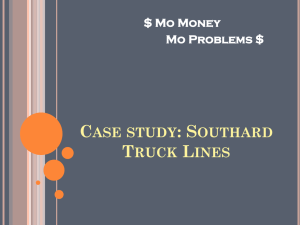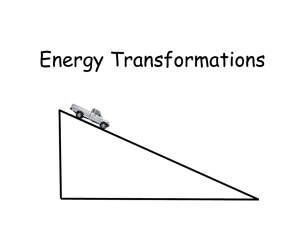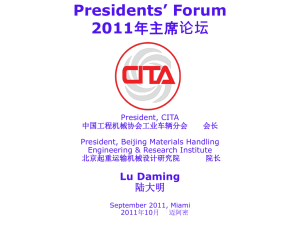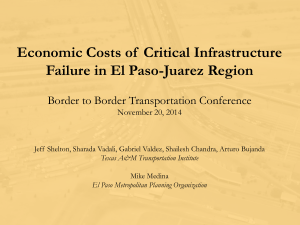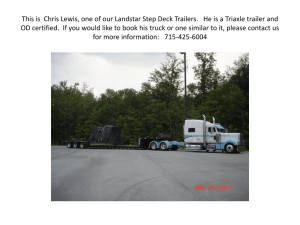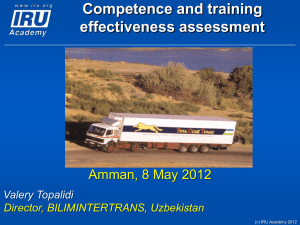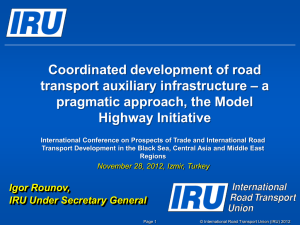Recent research (1)
advertisement
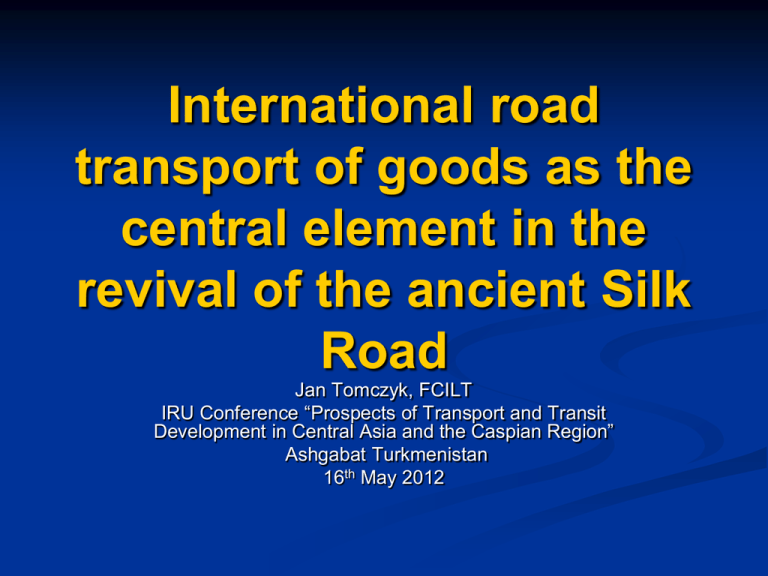
International road transport of goods as the central element in the revival of the ancient Silk Road Jan Tomczyk, FCILT IRU Conference “Prospects of Transport and Transit Development in Central Asia and the Caspian Region” Ashgabat Turkmenistan 16th May 2012 Approach Yes and No Yes: new roads will help generate more truck exports, imports and transit cargo No: new roads alone will not lead to faster truck cargo Why? Because getting trucks faster from point A to point B using new roads will not help much if, behind the border problems and border crossing point time delays are not solved Jan Tomczyk, FCILT Some BCPs have been modernized but are closed: Kyrgyz Kara Su BCP with Uzbekistan 2011 IRU Conference 16 May 2012 2 Recent research (1) The UNECE Europe Asian Transport Links project finds that border crossing points create major delays for trade and transport; The ADB TA7775 project identified several Central Asia border crossing point procedures and management methods making them perform in a sub optimum way; A World Bank project in Moldova draft findings indicate sub optimum border crossing point procedures and management methods what is the delay % v. total trip time comparison? See also the new OSCE-UNECE Handbook of Best Practices at Border Crossings for examples of challenges and good practice examples http://www.unece.org/trans/publications/wp30/best_practices.html Jan Tomczyk, FCILT IRU Conference 16 May 2012 3 Recent research (2) To sum up: Trade and transport is obstructed not only by hard infrastructure physical obstacles related to geographical constraints and poor infrastructure but also by non physical obstacles such as: (i) laws designed to control borders and trade not facilitate trade; (ii) control policies; (iii) sub optimum procedures and management methods; and (iv) lack of professionally motivated and trained staffs The message: none of it is fit for purpose which means inefficient export supply chains and expensive imports Jan Tomczyk, FCILT IRU Conference 16 May 2012 4 Recent research (3) 1. 2. 3. 4. Other physical and non physical trade and transport obstacles include: Lack of accession to international trade and transport agreements; Lack of intermodal transport infrastructure; Lack of professional international good practice logistics; and The absence of regional cooperation. The result: no predictable export, import and transit supply chains Jan Tomczyk, FCILT IRU Conference 16 May 2012 5 Recent research (4) 1. 2. 3. The next UNECE EATL Report Part VII will include a matrix describing BCP: Obstacles Causes, and Effects Each of the three descriptions includes: BCP human resources, BCP hard infrastructure, BCP management methods and BCP procedures Jan Tomczyk, FCILT IRU Conference 16 May 2012 6 Recent research (5) 1. 2. 3. 4. 5. EATL smooth working BCPs: Russian FederationBelarus Moldova-Ukraine Ukraine-Poland Belarus-Poland, and Georgia-Turkey Jan Tomczyk, FCILT BCP design good practice example: Sarpi on the Georgia Turkey border. Instead of one exit lane about 8 lanes each with two booths for Customs, built to the height of the truck drivers cab window. Drivers stay in the cab. This type of BCP is check point not a control point because export controls get carried out at the ICD. IRU Conference 16 May 2012 7 Recent research (6) 1. 2. 3. 4. 5. EATL hard working BCPs: Turkmenistan-Azerbaijan Russian Federation-Kazakhstan Kazakhstan-Kyrgyz Republic Iran-Turkey Kyrgyz Republic-Uzbekistan So, what are the challenges and solution opportunities? Jan Tomczyk, FCILT IRU Conference 16 May 2012 8 Recent research (7) Initial findings of export supply chains shows about 34% of time is waiting time The 34% waiting time consists of: (i) truck waiting outside and waiting inside an Inland Clearance Depot (ICD); (ii) on the border crossing point approach road waiting to get into the BCP Customs Control Zone One day spent preparing export support documents: “biegunok” Jan Tomczyk, FCILT IRU Conference 16 May 2012 9 Challenges and solutions (1) Professional truck driver visas Export and import documents International trade and transport agreements Poor hard infrastructure Punitive and arbitrary transit charges Intermodal transport Cost of logistics Rail transport Mismatch of public and private interests and agendas Jan Tomczyk, FCILT IRU Conference 16 May 2012 10 Truck driver visas Consulates give truck drivers a visa: not the challenge The challenge is how and when they give a truck driver his visa There is no fast track to give truck drivers a visa Truck drivers are not tourists or businessmen No truck driver visas available at BCPs: must apply in a consulate Giving truck drivers their visas might take several days Truck drivers must also get OVIR Registration even though they do not have an address because drivers sleep in their cabs Solutions: (i) fast track truck driver visas; (ii) consulates and immigration must keep a database to identify problem drivers allowing the good ones to get their visas in minutes; and (iii) use the Merchant Seamen ID method Jan Tomczyk, FCILT IRU Conference 16 May 2012 11 Export and import documents Export bad practice countries include: Tajikistan 11 documents, Afghanistan and Uzbekistan 10, Belarus and Kazakhstan 9 while many others insist on 8 documents. Why? Good practice example: Georgia 4 documents Import bad practice examples: Afghanistan, Azerbaijan, Belarus and Russian Federation insist on 10 documents Kazakhstan insists on 12 documents Good practice import documents: Georgia 4 docs Getting the export support documents and ICD and BCP “biegunoks”: multi “biegunoks” and they think this is normal! Lack of electronic Single Window Systems Jan Tomczyk, FCILT IRU Conference 16 May 2012 12 International trade and transport agreements Current sub optimum practice is the use of bilateral inter governmental road transport agreements Why is it sub optimum? Because a transit truck might cross more than one border for example a Turkish truck going to Kazakhstan might travel via Turkmenistan or via Russian Federation Bilateral agreements means “agreed contingent” of annual truck permits and is contra WTO and GATT Article V Bilateral agreements fix routes: no route flexibility and so no “free transit” Jan Tomczyk, FCILT IRU Conference 16 May 2012 13 Poor Road Infrastructure (1) Poor quality road pavement gives: (i) slower truck speeds=longer time to market; (ii) extra wear and tear of vehicles; and (iii) road safety challenge Congested border crossing point approach roads so trucks might wait 2 to 4 hours or more Many road border crossing points congested because the BCPs are located at geographical choke points such as villages and river bridges Many road border crossing points are not designed for the current and future traffics: they are not fit for purpose No ministry or border control agency is accountable for BCP approach road congestion and truck queuing for kilometres Good practice: create a BCP agency and make it accountable Jan Tomczyk, FCILT IRU Conference 16 May 2012 14 Poor Road Infrastructure (2) Some long distance road routes are on gravel roads Gravel roads give safety issues such as visibility and greater risk of tyre puncture Gravel roads result in slow truck speeds Expensive to convert to tarmac pavement Jan Tomczyk, FCILT Truck and trailer travelling along CAREC route in Kazakhstan to Uzbekistan on gravel road; September 2011 IRU Conference 16 May 2012 15 Poor Road Infrastructure (3) Some long distance road routes between Kazakhstan and The People’s Republic of China consists of narrow poor quality tarmac pavement Corrugation Worn and cracked Segments with no tarmac Trucks wander off road creating multi dirt tracks Jan Tomczyk, FCILT Truck on the road in Kazakhstan from Aktogay to Dostyk/Al Shankou on CAREC routes 1a and 1b; September 2011 IRU Conference 16 May 2012 16 Punitive and arbitrary transit charges International road transport quotas reduce competition Road transit fees are a charge on access to the market rather than an infrastructure use charge Buying TIR Carnets might include buying insurance from the same TIR association CMR and TIR trucks treated the same at BCPs: same size fits all syndrome No fast track lanes at border crossing points Jan Tomczyk, FCILT IRU Conference 16 May 2012 17 Intermodal transportation (1) Caspian Sea ferry links are a challenge: No fixed sailing schedule Cannot book truck space on the internet No on board insurance Ferries must sail only when full: some trucks in Aktau waited 7 days for a ferry Ferries main business carrying rail tanker wagons Ferry operators not looking for new truck business Truck driver transit visas might expire while they wait for a ferry Sub optimum ferries make cargo go by long distance road via Iran, Turkmenistan and Russian Federation Solutions: (i) eliminate State ferry monopoly; (ii) use intermodal road and maritime good practices; (iii) develop through rates Jan Tomczyk, FCILT IRU Conference 16 May 2012 18 Intermodal transportation (2) Good practice example Bad practice example Almaty Logistics Centre complete with A Class warehouse and rail to road fork lift trucks to lift containers Three bags at a time. Old wooden box car rail wagon means cargo must be reloaded into trucks by hand not by fork lift Jan Tomczyk, FCILT IRU Conference 16 May 2012 19 Logistics costs Landlocked countries depend on trade corridors and the performance of export supply chains in neighbouring countries: a chain is as good as all the links are goodone weak link and the whole supply chain is sub optimum High truck costs because of long distances, and Unpredictable transport times and rent seeking Lack of reliability leads to lack of investment Lack of reliability gives high warehouse inventory levels: Europe 3 to 4 days – Central Asia 3 to 4 weeks No Customs due diligence low risk programs No trade and transport facilitation benchmarking Jan Tomczyk, FCILT IRU Conference 16 May 2012 20 Rail transport Main railway delays: 1. Railway security 2. Waiting in queue 3. Change of railways gauge 4. Old track and old ballast=slow train times 5. Lack of modern signalling 6. Lack of freight yard computerization 7. Lack of tracking and tracing using IT methods 8. Old locos and old wooden box car wagons 9. Lack of interest using modern rail management methods: witness Kazakhstan wheat exported in hoppers and not in 20 foot lined 20 foot ISO Containers. Moldova exports wheat to Taiwan using 20 foot lined containers Jan Tomczyk, FCILT IRU Conference 16 May 2012 21 Mismatch of public and private interests and agendas The challenge: public bodies are control orientated not designed to give facilitation-the Josef Syndrome ICDs and BCPs display control procedures because that is the way it has always been done: the Customs Code Rules OK but it is not a trade and transport facilitation document The challenge: private companies are business driven and must manage sub optimum export, import and transit supply chains Government must balance security with safety and trade and transport facilitation but often use this pretext to control instead of facilitating legitimate trade Lack of trust between control agencies and the new rich traders The extra trade and transport costs are past onto consumers Jan Tomczyk, FCILT IRU Conference 16 May 2012 22 Solutions Please read Part VII in the next UNECE Europe Asia Transport Links Report which describes many solutions how to reduce land border crossing point times Please read the new OSCE-UNECE Handbook of Best Practices at Border Crossings: A Trade Facilitation Perspective Jan Tomczyk, FCILT IRU Conference 16 May 2012 23 Rahmiet, Spaciba, Thank You Thanking the following experts who helped with the research findings included in this presentation: Nurseit Niyazbekov, Valeriu Garstea and Eugeniu Hrestei QUESTIONS? Jan Tomczyk, FCILT Tazhen BCP Kazakhstan with Uzbekistan. Trucks might wait up to 3 days in the neutral zone. Trucks use this route from Europe to Afghanistan. Over 20 truck-trailers identified waiting in the neutral zone IRU Conference 16 May 2012 24
